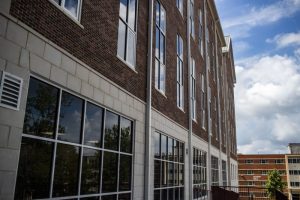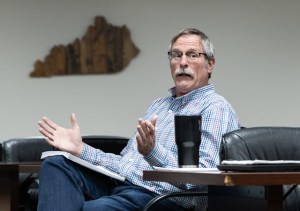Plans for academy at WKU advancing
Published 12:00 am Sunday, December 18, 2005
In high school, gifted students are often not challenged and lose interest in their education, according to a Western Kentucky University professor.
That problem is one reason the university is creating the Kentucky Math and Science Academy, physics professor Charles McGruder said.
Trending
“Very bright, gifted students are often bored in normal high schools, and it turns them off instead of turning them on,” said McGruder, who co-wrote the proposal to create the academy with Julia Roberts, the director of Western’s Center for Gifted Studies.
The academy will bring high school juniors and seniors from around the state to Western to take college classes. The courses will complete their high school education, and they will earn 60 college credits, nearly half the number needed to graduate from Western.
Students will live in their own dorm in Florence Schneider Hall, which will get a $10 million renovation. Western will seek bids for the construction in February, Roberts said.
The academy, which will initially accept 120 students, is scheduled to open for the beginning of the 2007-2008 school year, she said.
The high school students will be fully integrated with the college classes, at least academically, McGruder said. But they won’t be able to go out on their own for pizza at 2 a.m. like their older peers.
“They are taking college courses like everybody else,” McGruder said. “They are going to be in housing together and they are going to be chaperoned.”
Trending
The academy students will have their own clubs, as well as study and meeting spaces so the high school students can have “a wonderful social experience,” Roberts said.
The classes will be heavily geared toward math, physics and chemistry, though other subjects will be covered as well.
That’s because another goal of the academy will be to turn out more Kentucky scientists and engineers. The state is 47th in the number of students who go into those professions, Roberts said.
“That’s an unenviable position,” she said. “If your top students don’t even have the chance to study at advanced levels, then you stay in an unenviable position.”
Providing such a program in the state may help keep students in Kentucky, McGruder said.
“A brilliant student who doesn’t find the necessary stimulation in Kentucky will go elsewhere,” he said.
Convincing students to stay in Kentucky is important for the state’s future and economy, McGruder said.
“These are the very students who are going to be leaders of the next generation in Kentucky,” he said.
In other states, such as Texas, that have programs like the academy, even students who leave their home state for college are more likely to return after their education is finished, Roberts said.
“We would like our bright folks to come back and spend their adult lives in the state,” she said.
The academy will make Kentucky the 14th state with such a program, Roberts said. The oldest began in North Carolina 25 years ago and “is thriving,” she said.
“I think its important for people to know it’s a tried and true idea,” Roberts said.
The state legislature has not determined how the students’ education will be paid for. Roberts said they will be taking up the issue in the 2006 legislative session, and she hopes they will decide to fully fund the academy so students won’t have to pay tuition, or room and board costs.
This will make the academy accessible to everyone with the academic talent, Roberts said.
McGruder said the program is vital.
“I think the academy is going to be one of the greatest things that Western has ever done in this generation,” McGruder said.







